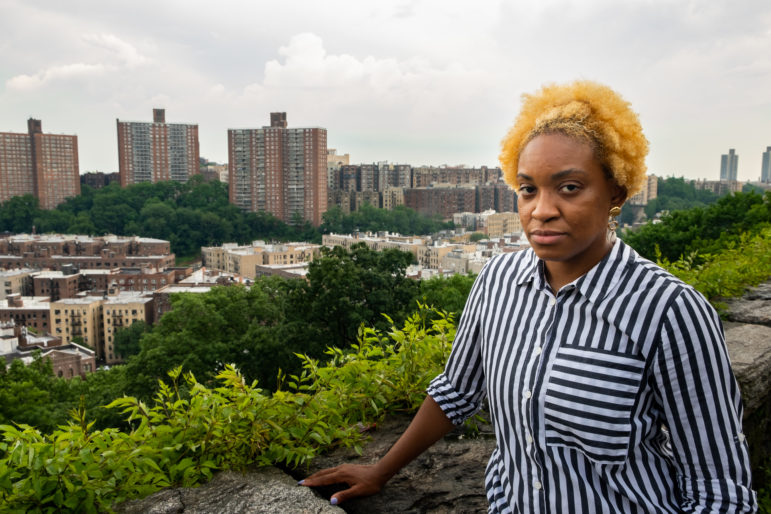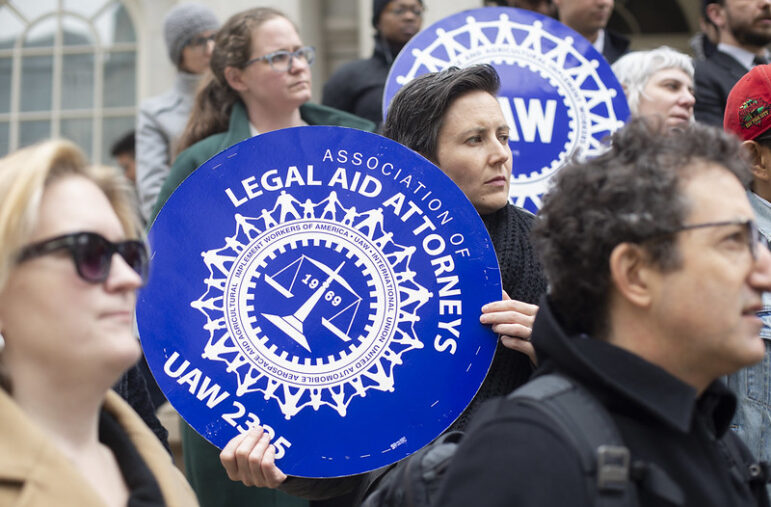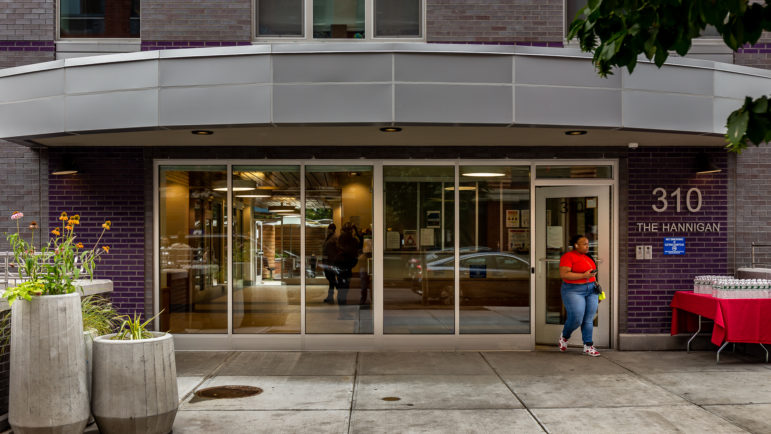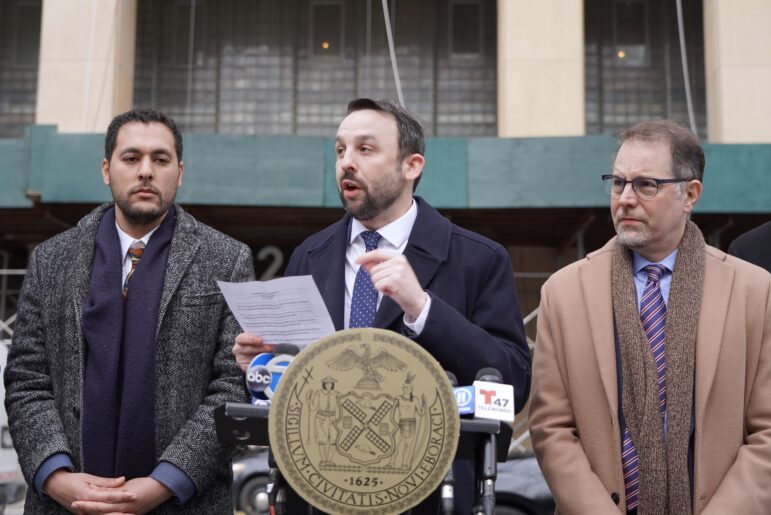Intro. 1867, which would expand the electorate on municipal ballots by giving voting rights to lawful permanent residents (green card holders) and immigrants authorized to work, has not been resolved in more than a year.

Adi Talwar
Melissa John launched the RepresentWe NYC initiative, which has a template for emailing local politicians to support the bill.This article originally appeared in Spanish. Lea la versión en español aquí.
Early voting for New York City’s primary elections opened on June 12 and candidates for all city offices are looking for eligible voters everywhere. In the midst of this political blitz by hundreds of campaigns, legislation that would allow New Yorkers with lawful permanent resident status (green card holders) to become voters has not been resolved in over a year.
The bill—which supporters had initially hoped would pass in time for this month’s primary election—remains on the shelves without changes. Meanwhile, the issue of who to give and who not to give the right to vote has become a contested issue among the mayoral candidates.
In January 2020, Councilmember Ydanis Rodríguez introduced Int. 1867 that, if passed, would allow legal permanent residents or those authorized to work in the United States to vote exclusively in primary, special, general, and runoff elections for mayor, comptroller, public advocate, city council member, and borough president. The bill does not include voting at the state level, much less the national level.
Advocates argue that doing so is not unprecedented for New York City, which for decades allowed noncitizens to vote in school board elections, according to a report from CUNY City College’s Colin Powell School.
The bill was introduced with a lot of momentum and seemed to have a good chance of passing because more than 30 councilmembers, from the more conservative side of the Council to the more progressive, had backed it. Shortly thereafter, the pandemic hit the city and the bill lost that initial political firepower.
It was just during the summer of 2020, during the Black Lives Matter protests, that Melissa John, an elementary school teacher, first read about the bill that would give lawful permanent residents the right to vote.
“I saw an article [about it] at local news, but I revisited the idea again in July,” says John by phone.
John identifies as a Black and Afro-Caribbean woman from Trinidad and Tobago, and in the midst of the protests over the death of George Floyd, she saw how there was an intersection between the issue of underrepresentation and race in the United States. In September 2020, she launched the RepresentWe NYC initiative, which has a template for emailing local politicians to support the bill.
“If I’m trustworthy to be a teacher to uplift kids why don’t I have the right to choose a politician?” says John. “We shall be part of the political conversation. We have no political representation. It’s taxation without representation.”
These questions led her to become more interested in the subject and to look for other initiatives that have given some kind of political representation to permanent residents elsewhere in the country. She soon found out that similar proposals had been approved in other places: For example, in College Park, Maryland, permanent residents had the opportunity to vote in the 2019 municipal elections.
According to Ballotpedia, 10 municipalities across the country allowed permanent residents to vote in certain types of local elections as of March 2020. Nine were located in Maryland and one in San Francisco, California. The state constitutions of Arizona and North Dakota, however, explicitly specify that non-citizens cannot vote in state and local elections.
The New York City Mayor’s Office of Immigrant Affairs (MOIA) estimates that 589,000 New York immigrants are legal permanent residents who are eligible for naturalization and would be impacted by the bill’s passage.
MOIA says it supports efforts to increase citizen participation, however, this particular bill raises some legal issues that the city is still considering. MOIA did not expand on what legal aspects would be problematic, but did say that the change would require a constitutional amendment and that the city cannot take action on its own. This argument has been used in previous legal pre-hearings about noncitizen voting, says Paul Westrick, senior manager of Democracy Policy at the New York Immigration Coalition, part of the coalition of 45 political and immigrant rights organizations that are pushing this bill commonly known as “Our city, our vote.”
Westrick and other supporters argue that under current law, New York City has the authority to expand voter requirements to explicitly include lawful permanent residents. To that end, the bill proposes to amend the New York City charter. Similar bills have been proposed since 2005, Westrick recounts. Similar bills have been proposed since 2005, Westrick recounts; the last time there was some progress on one was in 2013, when the City Council held a hearing on the legislation but it never came up for a vote.
After multiple attempts to find out what was keeping this year’s legislation shelved and whether or not it would soon have a hearing date on the Council calendar, Council Speaker Corey Johnson’s spokesperson would only say that “the bill is going through the legislative process.”
Despite the inaction, John believes that “politicians who have immigrant staff or are immigrant themselves, should understand the positive side of this bill; its potential.”
Councilmember Francisco Moya, the only member of the Council’s immigration committee who did not initially endorsed the bill but has since signed on to support it, will hold a rally on Thursday at Corona Plaza in Queens to push for a hearing.
“Our City’s next leaders have an opportunity to transform our city by expanding voting rights in municipal elections to include noncitizens and individuals who were previously incarcerated and are on parole,” says via email Theo Oshiro, co-executive director of Make the Road New York.
Oshiro believes that all New Yorkers, regardless of their immigration status, “should have a voice in the policies and resources that directly affect them.”









2 thoughts on “Bill to Allow Noncitizens to Vote in NYC Elections Languishes, Despite Majority Support”
Sorry, you have to be a citizen to vote. For a green card holder, that’s another hurdle, but we want you to become a citizen of the United States. Please join our country. Thank you.
People who are here illegally should not be here let alone be allowed to vote I say send them back to their native countries